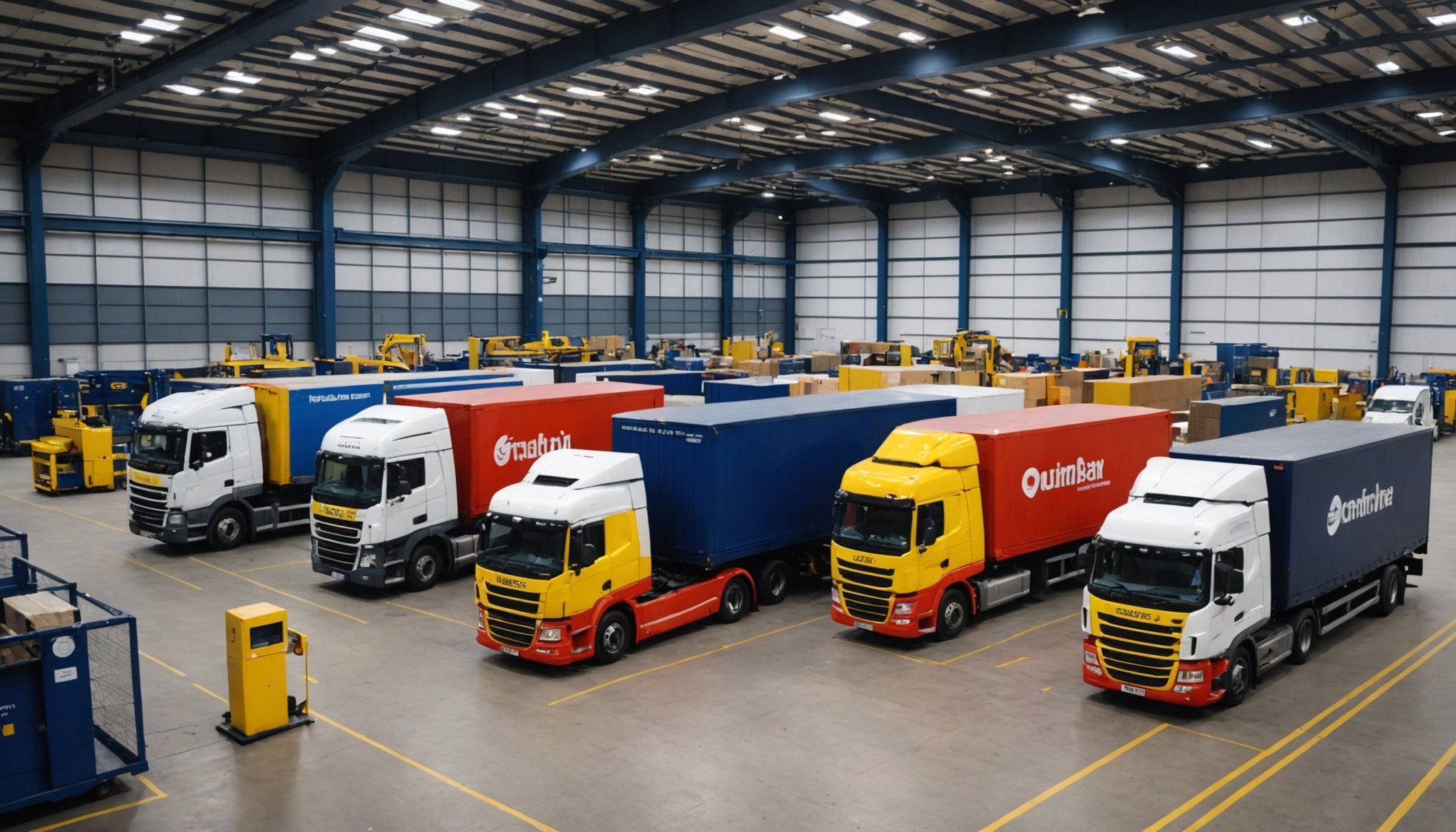Overview of AI in Fleet Management
AI technology in fleet management has become a pivotal force in transforming UK logistics. This tech innovation involves using advanced algorithms and machine learning to automate and optimise fleet operations. By analysing vast amounts of data in real-time, AI enables fleet managers to make precise and informed decisions, enhancing both operational efficiency and cost-effectiveness.
The current state of fleet management in the UK showcases a growing adoption of AI-driven solutions. Companies are increasingly integrating these technologies to streamline routing, improve vehicle maintenance schedules, and enhance driver safety. This transition is gradually redefining logistics practices, setting new benchmarks in efficiency and reliability.
In the same genre : Understanding curative and corrective maintenance for better outcomes
The importance of AI for future competitiveness cannot be overstated. As the logistics sector faces mounting pressure to deliver faster and more cost-efficient services, AI presents a sustainable solution. Logistics companies leveraging AI are better positioned to respond to market demands, reduce operational risks, and maintain a competitive edge. The result is a more resilient and adaptive logistics network, primed for future challenges.
Benefits of AI in Fleet Management
Introducing AI into fleet management offers substantial benefits. One primary advantage of AI is improved decision-making through data analytics. AI provides managers with precise insights by analysing vast datasets, enabling better forecasting and strategic planning. This capability helps enhance operational efficiency and resource allocation.
Topic to read : Understanding curative and corrective maintenance for better outcomes
Another significant benefit is cost reduction and resource optimization. AI streamlines processes, reduces unnecessary expenses, and ensures optimal use of assets. For instance, predictive maintenance AI can forecast vehicle breakdowns, preventing costly repairs and minimising downtime by scheduling timely maintenance.
Further, AI contributes to enhanced safety and compliance. AI systems continuously monitor fleet operations, ensuring adherence to safety regulations and compliance standards. They detect real-time anomalies, allowing instant interventions, which reduces risks and potential liabilities.
By utilising AI, fleet managers gain a competitive edge through efficient resource management and strategic foresight. The combination of improved analytics, predictive capabilities, and automation not only circumvents many traditional challenges but also maximises productivity and safety standards in fleet operations. These transformations mark a new era of operational excellence for fleet management.
Case Studies of AI Implementation in UK Logistics
Exploring real-world applications of AI in logistics provides valuable insights into its transformative potential. Below, we delve into specific examples to highlight the successful integration and benefits of AI in this sector.
Case Study 1: Example of a Successful AI Integration
In 2022, a leading UK logistics company implemented AI solutions to enhance its warehouse operations. AI algorithms were employed to optimize inventory management, resulting in significantly reduced overhead costs and faster order processing times. The improvement in operational efficiency was evident, with the company reporting a 30% increase in productivity.
Case Study 2: Logistics Company Transforming Operations with AI
Another compelling example is a logistics provider that utilized AI to revolutionize its supply chain management. By deploying predictive analytics, the company could anticipate demand more accurately, leading to a marked reduction in delivery times. The streamlined processes not only improved customer satisfaction but also augmented the firm’s competitive edge in the market.
Case Study 3: Measuring the Success of AI in Fleet Management
A remarkable implementation involved AI in fleet management, focusing on real-time asset tracking. Key metrics, such as fuel efficiency and vehicle downtime, were meticulously monitored, resulting in a 20% decrease in operational costs. This measurable success illustrates the practical benefits of AI, enhancing decision-making and strategic planning in logistics operations.
Industry Trends Driving AI Adoption
The logistics industry is experiencing a transformative shift with the increasing adoption of AI-centric solutions. In recent years, the integration of big data and the Internet of Things (IoT) has significantly influenced the future of fleet management. As more companies embrace digital transformation, AI is playing a pivotal role in optimizing operations, enhancing efficiency, and reducing costs.
AI-driven platforms are enabling real-time fleet management by analysing vast amounts of data. This includes vehicle performance metrics, fuel consumption, and predictive maintenance schedules. The use of IoT devices affixed to trucks and other vehicles provides continuous data streaming, offering fleets the capability to make informed decisions swiftly.
Looking towards the future, experts anticipate a greater reliance on AI to drive advancements in logistics. Key predictions include autonomous vehicles, smarter route planning, and enhanced safety protocols through AI-enhanced logistics industry trends.
These strides in technology will likely lead to a more streamlined and responsive logistics ecosystem, catering to the evolving demands of global commerce. As companies continue to focus on sustainability and customer satisfaction, AI’s role in fleet management will grow, adapting to the future needs of the industry.
Expert Opinions on AI in Fleet Management
Expert insights into the application of AI in logistics reveal both enthusiasm and a measured approach to its adoption. Leading logistics professionals emphasize that AI holds the potential to radically transform fleet management, presenting opportunities for increased efficiency and cost savings. However, they also recognize the challenges involved, including the integration of AI systems with existing operations and the need for ongoing training.
Professionals advise that one of the major hurdles in AI adoption is the technical complexity it introduces, requiring upskilling for the workforce. Overcoming challenges such as these is crucial for the successful implementation of AI technologies. Experts recommend taking a phased approach, starting with small pilot projects before full-scale implementation.
Looking ahead, experts are optimistic about the future implications of AI on the logistics workforce. While there is concern about job displacement, many believe AI will create new roles and opportunities, changing the nature of work rather than removing it entirely. The emphasis will likely shift towards roles that require more analytical and technical skills, underscoring the importance of continuous education and adaptability within the industry.
Actionable Strategies for Implementing AI Solutions
Implementing AI solutions requires a strategic approach that aligns with your organisational goals. First, assess your company’s readiness for AI adoption. This involves evaluating existing infrastructure and technological capabilities to determine if they can support AI initiatives. Additionally, it is crucial to identify specific business challenges that AI can address, which ensures that resources are allocated effectively and goals are met.
Once readiness is assessed, proceed by developing a phased implementation strategy. Initiate with pilot projects to understand potential impacts and refine processes based on initial learnings. This gradual approach helps in identifying any hurdles early, providing an opportunity to make adjustments before full-scale deployment. Furthermore, a phased strategy allows you to measure trial outcomes and adjust plans accordingly, enhancing the overall success of AI projects.
An often overlooked but essential step is training and upskilling employees for AI technologies. Equip your team with the necessary skills to manage and utilise AI tools effectively. This can involve workshops, online courses, and hands-on training sessions. By investing in workforce development, organisations ensure a smoother transition and foster a culture of innovation, empowering employees to contribute effectively to AI implementations.






